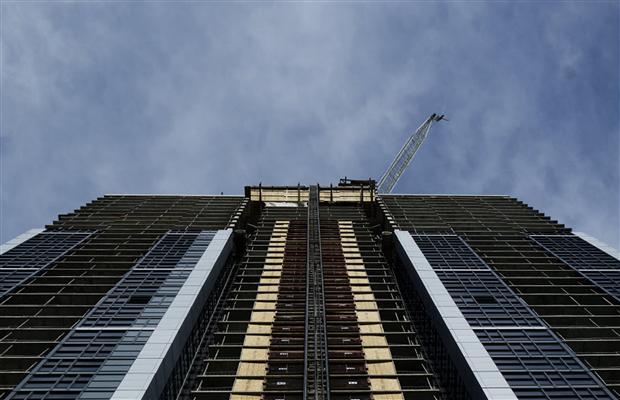
BY MARILYN WILSON, THE OTTAWA CITIZEN January 24, 2013

Many purchasers think it’s unnecessary to hire a building inspector before purchasing a new condo. Prospective buyers often assume a condo building and their unit of interest is fine and everything is to code and working properly. While this is usually the case, purchasers still need to protect themselves against those rare occasions where there is a pre-existing problem.
A friend of mine, for example, moved into a newly constructed condo where someone had inadvertently dropped a piece of plywood down the flu, blocking it off. When the new owner lit the fireplace, smoke backed up through the unit. Although the condo corporation took care of the fireplace, the owner was responsible for the smoke cleanup. A pre-purchase inspection would likely have avoided this problem as the offending piece of wood was within view of a casual look up the chimney.
I have sold many condos where buyers think they do not require an inspection but every condo should be inspected by a certified building inspector. Remember: It’s a good idea to put a building inspection clause into your offer. And it’s important to find a building inspector who is familiar with condo inspections. He or she will be cognizant of the types of problem to look for and of condominium building codes and regulations.
“What does an inspector check in a new condo? Isn’t this a waste of time and money?” I am asked this all the time.
An inspector will make sure your hood fan exhaust is properly connected. He will ensure that the electrical system is to code, in working order and adequate to meet any special electrical requirements you might have. Windows will be inspected to see they are installed properly and to regulation. A good inspector will also check the common elements to see if any owners who moved in before you have inflicted damage to the halls or elevators.
Is the garage constructed to code with adequate drainage to prevent flooding, winter road salt spalling and excessive humidity buildup? An inspector will check the drainage in the garage and your parking spot. You want to make sure when you open your trunk to take out your groceries you are not always standing in a puddle of water.
The inspector will check the condo’s exterior envelope to see if it has adequate drainage and if it will deter ice buildup. Since the balcony is both the exterior element in which you will spend the most time and is also a source of liability (e.g.: ice buildup or water-damaged tiles blowing down onto the cars below), it will be examined carefully for potential problems (remember, this new condo has not yet had time for water seepage to cause obvious defects).
Inspectors will check the roof and any air conditioning units located there, the security gate to the garage and many other things you would not think to consider.
The biggest factors are plumbing, electrical, heating and wiring. These must be to code, meet regulations and be suitable to accommodate any special requirements you, the buyer, might have. To further emphasize, a recent inspection revealed an ice buildup problem that, if not caught by the inspection, would have cost the buyer, along with the condo corporation, $20,000 to correct. Definitely not a nice housewarming present.
Arkadi Abramovitch of Artech Home Inspections told me recently that technology has changed a lot in the past few years and this has helped to ensure buyers have a positive buying experience. Arkadi, along with many inspectors today, use infrared equipment to check for moisture buildup in or behind the walls or ceilings, which would not normally be visible.
Inspectors check the exhaust systems for bathroom ventilation fans and kitchen hood fans that have sometimes been blocked inadvertently. A memorable condo inspection Arkadi had was when he once found two Tim Hortons cups in a kitchen ventilation exhaust system.
In new construction the exhaust vents directly to the exterior, but this has not always been the code. Older condos have different regulations. Inspectors also check for code/regulation problems as overworked city inspectors may have missed something or not been on site as many times as requested.
It’s better to find out before closing on your unit than to try to fix the issue (and be reimbursed) later. Ask the inspector specifically for his or her impressions of the common areas as they may or may not do this if they aren’t asked specifically.
By now I hope you are sold on the need for a building inspection for a new condo and it should be evident that this applies even more so to a resale condo. When first considering a resale condo, it’s a good idea to ask residents (if you know any) about previous problems with the building. When you request a building inspection, ask the inspector to address specifically these previous problem areas. (Of course, you are going to have both your lawyer and your insurance agent review the Status Certificate before signing off on the purchase.)
On the flip side, I encourage sellers to get a pre-inspection for their condo before their property is listed for sale. This gives the seller a chance to circumvent potential hindrances to a sale. A buyer who has decided to purchase a property is generally disappointed his building inspection reveals scrapes and bruises and, in a buyer’s or balanced market, may often try to renegotiate the price or walk away from the deal. If the buyer and seller are both using their condo sense, the chance of a mutually-satisfying outcome is increased.
Marilyn Wilson has been selling real estate for more than 23 years and owns Marilyn Wilson Dream Properties Inc. Brokerage, an Exclusive Affiliate of Christie’s International Real Estate. She can be reached through dreamproperties.com or follow her on Twitter@marilyn_wilson.
© Copyright (c) The Ottawa Citizen